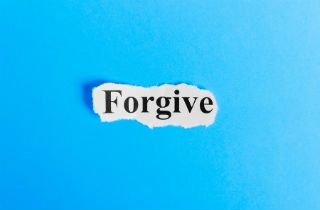Injuries from Family Addiction are Deep
As we approach the “Holidays”, many of us who come from families with addiction are filled with a special kind of trepidation. Wounds created long-ago easily erupt ….whether we are spending time with family, or not. There are reminders at nearly every turn of:
- Disappointment
- Frustration
- Embarrassment
- Pain
And though we may tell ourselves to “let it go,” or “focus on today,” those injuries are often not so easily healed.
In this article, I’ll walk you through the process of forgiveness. I’ll offer you a step-by-step method that has worked for me. Then, I invite your questions at the end. Please write in! We love hearing from our readers and will take the time to respond to you personally.
A Season of Joy?
When I was a child, I looked forward to Christmas as a time of magical family happiness. But what happened was often the polar opposite. Here’s what the Holidays typically looked like in our home:
- Decorations were hung with criticism and complaint until finally I stopped participating because I couldn’t ever do it right.
- Gifts were selected with resentment and anger about having to spend money on people we didn’t like or who didn’t deserve a gift.
- Family came together to criticize dress, food, or academic performance, and the nasty under-breath comments would start early in the day.
None of this was helped by the drugs and the alcohol, and for years I always wondered why the day always ended in screaming and tears.
I am sure these feelings are familiar to many.
Today, there are many of us who look at the holiday time as something to get through, not something to delight in.
The Gift of Forgiveness
Regardless of religion, faith, or lack thereof celebrations in the dark winter months are ultimately about bringing light into darkness, and hope where this is a feeling of hopelessness. That can be hard to experience under the oppression of addiction or alcoholism, and even harder when we hold onto the pain caused by those conditions.
The promise of forgiveness is freedom to enjoy our lives today, to let go of that pain and resentment, to create room for light in something that is dark. For many, though, the idea of forgiveness is akin to giving up your identity. You might be asking yourself,
- Who am I without this anger?
- What do I do with my emotions if I can’t use them to hate?
- Why must I do the work, when I’m clearly not at fault?
Forgiveness is not about pretending something didn’t happen, or ignoring your pain. Neither is it a free-pass for the person who caused the harm. To forgive is not to say “it is okay.”
Forgiveness simply means to stop feeling angry or resentful. In effect, you cancel a debt; you accept with understanding a mistake.
For me forgiveness is about making a choice for my life: do I want to spend my day looking at the world with anger, or with opportunity?
Do You Want to be Happy or Miserable?
I grew up in a household with alcoholism and addiction and I spent years of my life angry and unforgiving for the mistakes they made. Then, with a lot of hard work I forgave them because I was miserable and I wanted to be happy.
When you forgive it doesn’t mean you forget… and it doesn’t mean you don’t change your interactions with the person you are forgiving. It simply means you are willing to give yourself the room to feel something other than anger, resentment, or sadness.
When you cancel a debt it doesn’t mean you have to lend to that person again. What it means is that you can focus on whatever is next in your life. You can move on.
3 Steps to Forgive a Drug or Alcohol Addict
So how can you forgive and give yourself the gift of opportunity and light?
STEP 1: Acknowledge the pain, the hurt, the anger. Take 30 minutes and write it down, draw a picture of what this feels like, act it out or in some other way express your experience.
STEP 2: Be mindful that whatever you experienced happened and is over. Now you have a choice about whether you engage in a similar scenario again or not. If you get burned every time you touch the stove, stop touching the stove don’t expect the stove to change.
STEP 3: Consider three things you can do differently to avoid this harm in the future. Here are some ideas that you can use:
- Stay away from the person or place who triggers you.
- Have a plan to respond to a triggering activity.
- Create a distraction for yourself when stressed.
- Ask a friend for help or support.
- Create an alternative experience.
Forgiving doesn’t mean you stop feeling sad about what happened, or disappointed by the fact that you might not get the experience you always wanted. I will not have that picture perfect holiday I have always wanted with my family of origin and that is disappointing.
But knowing this truth and accepting the disappointment is a whole lot better than trying to force a situation that cannot be and then spending my day, week or month angry.
The gift of forgiveness is a gift of freedom to feel something new, to experience something differently. It is a gift we can give to ourselves and it can certainly make the Holidays a whole lot jollier.









Related Posts